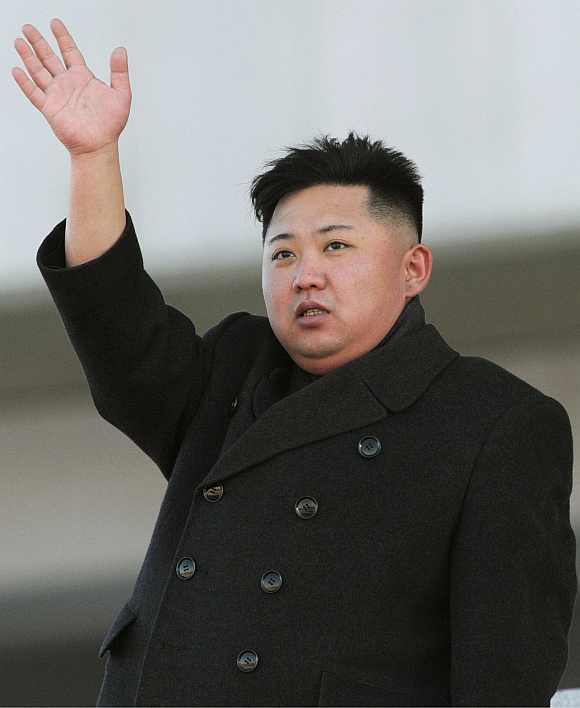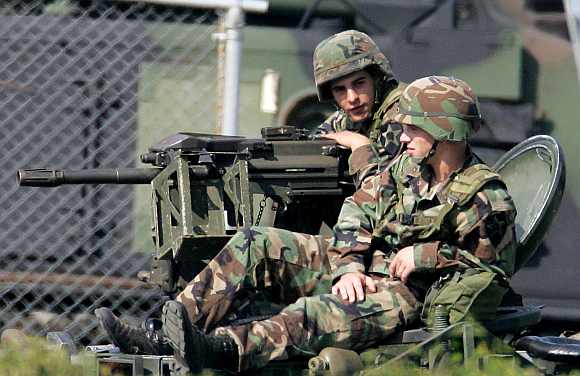 | « Back to article | Print this article |
Living next to a crazy dictator
In Seoul, Nikhil Lakshman discovers, fears about North Korea and its bizarre ways are never far away.
While Pakistan's rulers are adept at persistent perfidy and consistent subterfuge to hoodwink allies and adversaries alike, North Korea's dynastic leadership has cleverly used irrationality as its calling card.
Sample this latest craziness from Pyongyang. On March 1, North Korea promised the United States that it would suspend nuclear tests, long-range missile launches and enrichment at its uranium facility in Yongbyon (never mind that North Korea's nuclear warheads are sourced from plutonium!) and allow nuclear inspectors back if the US provided food to its starving population.
Thrilled that they had made this breakthrough with the new North Korean regime led by the 29-year-old Kim Jong-un, the Americans gave it their thumbs up and agreed to provide 20,000 tonnes of food every month to starving children and women, only to hear that Kim the Third (his dad was Kim Jong-Il) would launch a rocket on April 15, to mark his grandfather and the founder of the North Korean State, Kim Il-Sung's centenary, breaching almost instantly the terms of the agreement he had reached with the US.
That was not all. Kim III declared that the Nuclear Security Summit in neighbouring Seoul on March 26-27 was an act of aggression against his country and if the summit censured North Korea's nuclear programme, he would launch an immediate missile attack. Unnerved, the Americans even suspended a mission to recover the remains of missing US soldiers from the Korean war of 60 years ago.
North Korea came up for discussion at Prime Minister Manmohan Singh's meeting with South Korean President Lee Myung-bak (a personality the late Kim Jong-Il, his son and their acolytes detest) on Sunday. Though India does half a billion dollars worth of trade with North Korea! and is one of just 25 nations to have an embassy in Pyongyang, New Delhi has never hidden its distrust of the North Koreans. (Despite that misgiving, India provided $1 million in food assistance to North Korea last year.)
Both Kim Il-Sung and his son Kim Jong-Il actively conspired to provide Pakistan with ballistic missile technology in return for nuclear know-how. You can read more about the Pakistan-North Korea nexus here on Rediff.com.
Click NEXT to read further....
For Rediff Realtime News on the Nuclear Security Summit, click here!
Living next to a crazy dictator
Or maybe Kim III just emulated his dad Kim II -- who shamelessly sucked up to his father, Kim I, reportedly putting on the older man's shoes for him every morning, to ensure his succession to the leadership.
It is not envious siblings alone that Kim III has to contend with; many of his generals may think he is too young to run a complicated country like North Korea, with its byzantine and devious statecraft.
Already, there has been talk about a purge like none other in recent time. On Friday, London's The Independent newspaper, quoting the South Korean newspaper Chosun Ilbo, reported (external link) on Friday that mortar rounds were used to eliminate army officers disloyal to Kim III so that no traces of their bodily presence would be discovered.
Unlike the Line of Control, which separates India and Pakistan in Jammu and Kashmir and which is protected by some of the Indian Army's best soldiers as Rediff.com reported last week, a large US military contingent helps the South Korean army guard the Demilitarized Zone separating the two Koreas.
Living next to a crazy dictator
Why do American soldiers need to be at the DMZ, since the competent South Korean military -- which incidentally engages with its Indian counterparts more and more (India will post a defence attache for the first time at its embassy in Seoul this year) -- could easily take care of the reportedly hungry and weak North Korean army?
Earlier this month, speaking in Hawaii, US Secretary of Defence Leon Panetta declared, 'We are a Pacific power, we're going to remain a Pacific power and in order to do that we need to have a force projection in the Pacific. We maintain these forces not only for the protection of South Korea, but also as a force to indicate that the US is going to always maintain a military presence in the Pacific.'
Panetta's affirmation of US power in the Pacific was directed not as much at Pyongyang, but at its patrons in Beijing who have provided North Korea with the support and resources to stay in business at times when it was felt the Kim regimes were all set to collapse. It was also China that facilitated Pakistan's military interactions with North Korea in its quest to hobble India.
In his provocative book The Nuclear Express: A Political History of the Bomb and its Proliferation, former US air force secretary Thomas Reed makes the controversial argument that 'China, in about 1982, under Deng Xiaoping, decided to proliferate nuclear technology to the Communists (read North Korea) and Muslims in the Third World (read Pakistan)... they did so deliberately with the theory that if nukes ended up going off in the Western world from a Muslim terrorist, well, that wasn't so bad... That's what the-old timers thought.'
The younger generation of Chinese leaders, Reed added, alluding to careful technocrats like Hu Jintao and Wen Jiabao, is 'adamant about keeping a lid on nuclear technology... When the North Koreans decided to test, they clearly did so without a Chinese permit and it really frosted the Chinese.'
China will have a new leader next year. Xi Jinping, unlike his predecessors, is known to have his power base in the People's Liberation Army, whose hawks are said to be anxious for an aggressive assertion of Chinese power soon. Xi's support for Kim III's fledgling regime is critical to its survival.
Most Indians -- save the far right -- do not ever want a return to the nation that was severed in 1947. Most Koreans in contrast savour the prospect of reunification, a return to the one Korea that existed before Chinese supported Communists waged bloody war and eventually ensued partition. That can only happen when North Korea's regime collapses not under the weight of its many contradictions, but when its starving people finally decide they have just about had it with the Kims and their despotic ways.



